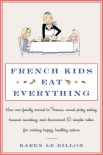French Kids Eat Everything Karen Billon (romance novel chinese novels txt) 📖

- Author: Karen Billon
Book online «French Kids Eat Everything Karen Billon (romance novel chinese novels txt) 📖». Author Karen Billon
Then I checked my timer. Out of curiosity, I had decided to time our Slower Food episodes to see how much we were really slowing down. The timer surprised me—thirteen minutes! Usually a mousse took me at least ten minutes to make (in part because I wasted so much time fishing tiny pieces of eggshell out of the bowl). I had added only three extra minutes, but the experience had been totally transformed.
A similar magic was at work at dinner when I pulled the mousse out of the fridge. It was the only time I got up during the entire meal. Usually, I got up and down about ten times to fetch things I’d forgotten, but this time I had prepared the table as if we were going on a long car ride on the highway—I put out everything we would possibly need and only called the girls when I was completely ready. It was remarkable what a calming effect this had, as I was no longer jumping up and down to grab forgotten utensils, bibs, napkins, paper towels, salt, butter, water, or whatever else we needed. I even set out a candle and dimmed the lights. It had a hypnotic effect on the girls, who spoke in hushed tones throughout the entire meal.
“Now, girls, on va déguster,” I said, reminding myself to speak cheerfully. “What does that mean?” I prompted them.
“Mangez leeentement, Maman!” they replied, almost in unison. For a second, I had one of those inspiring moments of parenthood when the children seem angelic, and you can delude yourself about the extent of your parenting skill.
My reverie was predictably interrupted. “Claire got more than I did!” Sophie whined, her face crumpling. I looked, and it was true. Claire’s ramequin was slightly fuller on one side than Sophie’s (another advantage of ramequins is that they enable precisely equitable servings—no more sibling disputes about who got a bigger piece). A little extra dollop of mousse solved the problem, and we began eating.
Or, rather, we began our dégustation. After a false start, in which they dug in for their usual huge bites, Sophie and Claire delighted in taking the tiniest possible morsels with their spoons and ever-so-slowly bringing them to their mouths. It even became somewhat of a game: Who could finish last? Sophie, competitive as ever, tried to trick her sister into eating faster, but Claire was following her papa’s lead.
Eating slowly allowed us enough time to actually talk about the mousse. What did it feel like when you put it in your mouth? How long did it take to dissolve if you held it on your tongue? Was it slightly bitter? Salty? Sweet? Was it less crunchy than usual? Why? Was the mousse less fluffy at the bottom of the bowl? Why? How does it feel when it travels down to your tummy? Sophie had lots of observations to offer, and even Claire had something interesting to say: Papa, it tickles my tummy!
“Oh, la grosse gourmande!” my husband replied teasingly. I had recently figured out what this word meant: someone who is enjoying, savoring, delighting in their food (perhaps slightly to excess, so when it is used to refer to children, it has a warning yet indulgent undertone). Glouton (literally, a glutton), on the other hand, was someone who loves to eat, even overeat, and not necessarily good food. And a gastronome is someone who likes—and is educated about—the right way to eat food well (Molière’s “Manger juste et bien”).
Another lightbulb went on. I finally realized why the French were so insistent that ordinary people could be gastronomes: these are simply people who appreciate food. The best translation I could come up with was “fan” (like a sports fan). From the French point of view, everyone could (and should) be passionate about food, just like Americans with football, Canadians with hockey, or the British with soccer. Eating is France’s national passion, just like sports back home—except that everyone gets to play.
Philippe laughed when I told him about this idea later that evening. “Don’t get too intellectual,” he warned. “It’s just food!” We were sitting in the salon, enjoying a tisane (French herb tea) after putting the kids to bed. It had taken a little longer than usual, as an unexpected side effect of our dégustation was that the girls had been smeared with chocolate—especially Claire, who had gotten a second, unanticipated post-dinner bath. But we had still all enjoyed the dinner—especially Philippe.
Until now, meals with our children had been one of the low points of his day. Coming home tired from work to a house with hungry children whining at the table almost invariably gave him a headache. Now I understood why: he expected the family meal to be a moment to relax and unwind, but instead it was stressful and unfulfilling. And I had been making it worse by rushing around the kitchen, expressing my tension (and, if I’m being honest, my resentment) by slamming cupboards, dropping things, burning pots, jumping up and down, and rushing everyone through the meal. Usually, he retreated to his computer after the meals, in silence. Tonight was one of the first happy evenings we had spent together in what felt like weeks.
My choice to slow down had been focused on the kids, but it had also made Philippe happier. Tonight he’d been relaxed enough to want to chat. I was glad because the months since we had moved to France had been tense. More than once, I wished that we—that I—had never decided to move. Maybe, I thought, meals were an unexpected way to start enjoying each other’s company again.





Comments (0)